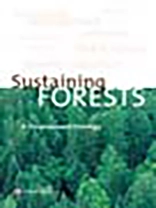The World Bank’s Forests Strategy, adopted in October 2002, charts a path for the Bank’s proactive engagement in the sector to help attain the goal of poverty reduction without jeopardizing the environmental values intrinsic to sustainability. This strategy replaces the Bank’s 1991 Forestry Strategy, and was developed on the basis of the findings of an independent review of the 1991 strategy and a two-year consultative process with development partners and stakeholders around the world.The revised strategy, Sustaining Forests, is built on three guiding pillars: harnessing the potential of forests to reduce poverty, integrating forests into sustainable economic development, and protecting global forest values. Recognizing the key role forests play in contributing to the livelihoods of people living in extreme poverty, government and local ownership of forest policies and interventions are emphasized along with the development of appropriate institutions to ensure good governance and the mainstreaming of forests into national development planning. The strategy also aims to support ecologically, socially and economically sound management of production forests by ensuring good management practices through application of safeguard procedures and independent monitoring and certification.Implementation of the strategy will center on building and strengthening partnerships with the private sector, non-governmental organizations, and other donor agencies to promote better forest conservation and management at country and global levels.
World Bank
Sustaining Forests [EPUB ebook]
A Development Strategy
Sustaining Forests [EPUB ebook]
A Development Strategy
Cumpărați această carte electronică și primiți încă 1 GRATUIT!
Limba Engleză ● Format EPUB ● ISBN 9780821383469 ● Editura The World Bank ● Publicat 2004 ● Descărcabil 3 ori ● Valută EUR ● ID 5845482 ● Protecție împotriva copiilor Adobe DRM
Necesită un cititor de ebook capabil de DRM












